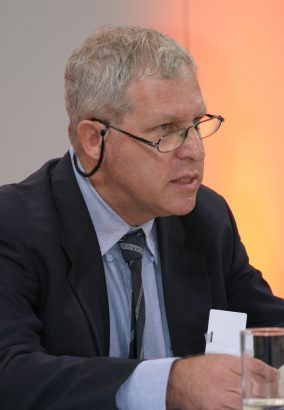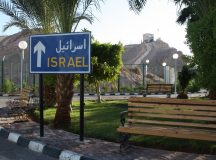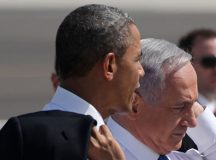Giora Eiland served in the IDF for 33 years, rising to Major General. He left the IDF in 2003 and in 2004 Prime Minister Ariel Sharon asked him to lead the National Security Council, a role he held until 2006. He is a former senior research associate at the Institute for National Security Studies (INSS). Eiland spoke to Fathom assistant editor Samuel Nurding on 28 April in London about the current situation in Gaza and the need for a strategic Israeli response.
Samuel Nurding: Let’s start with the situation in Gaza, where there is a humanitarian/energy crisis. The Palestinian Authority (PA) has announced that it will stop paying Israel for the electricity it supplies to the Gaza Strip, as well as introduce other measures to weaken Hamas. How can this humanitarian crisis be resolved?
Giora Eiland: Mistakes that have been made by many players, including the State of Israel. First, let’s call Gaza what it is: a state. It has very clear borders, a central government in Hamas, an independent foreign policy and an army. Now it might be a state of hostile people but it is still a neighbour of Israel and wherever you have a neighbour, even in a state of war, you can share some mutual interests. And when we try to evaluate the interests of Israel vis-a-via Gaza and vice versa we find that the conflict between the two sides is not as big as it seems. Israel does not have any territorial interest in Gaza, nor any political interest or economic interest. The only interest we have in Gaza is security – we simply don’t want them to shoot at us.
When you ask what the interests of the government in Gaza are, its primary interest is to secure its continued control. And in order to achieve that they need two things: international legitimacy and urgent economic assistance. When you compare the Israeli interest with the interest of Hamas in Gaza you do not see any real conflict. Hamas and Israel have the same interest: to ensure that financial assistance is given to rebuild infrastructure.
So why then does this not happen? For two reasons. First, the international community does not recognise that Gaza is a de facto state and insists that all financial aid is given to the PA in Ramallah. But the interest of the PA is not to see Gaza prosper and succeed because that might enhance Hamas. The PA wants to make the situation in Gaza as poor as possible in order for Fatah to succeed against Hamas. So both the people of Israel and of Gaza are going to pay the price of the PA’s cynical political game here.
Let’s try to help this government to improve the life of the people there. If we do not then I am afraid we will see another round of violence. Not because Israel is guilty but because the PA is pushing Hamas to take the only option they have and this is to open fire on Israel and attract again the attention of the international community.
SN: You mentioned the cycle of violence that Israel has endured since 2008. Are there parallels to be drawn between the slide towards escalation in 2014 – undesired by both sides – and this situation now?
GE: The situation today is much worse than the situation that existed prior to the war in 2014. I say this for two reasons. First, the impact of the 2014 war. Israel caused devastation in Gaza and there are still hundreds of thousands of buildings that have not been rebuilt. Much of the infrastructure was affected. And second, the policy of Egypt after the war. Egypt actually blocked the border with Gaza. Now Gaza is in a very dire situation. Also, after the war the international community made a decision to establish a mechanism to rebuild Gaza, but unfortunately the big cats were given the mission to keep the cream. Egypt was to lead this mechanism and the PA was the address to send the money to. Now, if there are two players around the world who have the least interest in helping to rebuild Gaza, it is Egypt and the PA.
As long as Israel continues to support the approach of the international community, which is not to speak with Hamas, but only the PA, then we contribute to this dire situation. The time has come for us to say that if we want to prevent another crisis in Gaza that will lead to problems between us and Hamas then we have to work with the existing government of Gaza. It doesn’t mean that we are going to recognise each other, but it does mean that we have a shared interest in solving some of the problems there.
SN: Is there anything Israel can do now to alleviate the suffering of Gazans?
GE: I believe there are some tactical measures that can be taken. Although Israel has increased the number of trucks going into Gaza, and maybe Israel can supply more water and electricity, these are not solutions to the underlying problems. Israel is at fault to some degree for the lack of options for Gaza. One of the problems you mentioned is the lack of electricity. There is only 4 hours of power per day and even the supply of fuel for the sole power station in Gaza is going to run out soon. Turkey offered about a year ago to send two ships with huge generators which can be connected to the Strip’s electricity grid and can supply electricity. They were willing to do this as a contribution from Turkey to Gaza. But Israel had to agree because we control Gaza’s maritime parameter; Israel refused Turkey’s proposal and I think this was a mistake.
The fact that Israel does not cooperate with certain countries who do want to work with the government of Hamas due to some false political consideration is a mistake. It might backfire because we might experience another round of violence and then we will have to explain to ourselves why the Israel deterrence policy did not work. If you want to work successfully you have use both sticks and carrots. Israel knows very well how to use the stick but that’s not enough, now we need the carrots and this element is missing.
SN: You mentioned that the de facto government in the Gaza Strip is Hamas, who announced this week that it has a new document that provides a new political strategy. They also have a new leader in Gaza, Sinwar, and will have a new political leader in Qatar. To what extent is there a change of direction for Hamas?
GE: The change in Hamas’s official policy is a result of two things. First, they want to distinguish between themselves and the Muslim Brotherhood (MB) in Egypt. Hamas is known as the small Palestinian sister to the MB in Egypt. Hamas understands very well that they need the support and cooperation of Egypt and as long as the main opposition to President Abdel Fattah al-Sisi is the MB, they have decided it is not a very good idea to be associated with it. So they are now trying to say, ‘We are not part of the MB but we are an independent Palestinian movement with or own political ideas’. Second, in order to control Gaza they need some form of international legitimacy, otherwise the money will not flow. And in order to please the world they have to speak in much more moderate terms to persuade more players that they are a pragmatic player that can be a partner for dialogue. It is a positive move and shows that pressure can work but I don’t know if it is tactical or reflects a big change in its official policy, which until now has been that the State of Israel should be destroyed.
SN: Is it better for Israel to have someone like Sinwar who they know very well from his time in prison at the top of Hamas in Gaza rather than a complete outsider?
GE: I think we know very well everyone is who might be a leader of Hamas. We know the military leaders who have later moved to be political leaders, just as it happens in Israel, through the intelligence services, and others we know very well by observing them. During the last operation in Gaza, when Israel wanted to drop a bomb on a certain building, Israeli intelligence knew exactly who lived there and their telephone numbers so that we could give them an early warning. Israel’s knowledge about Gaza and the people there is very deep.
SN: Thinking about Israel’s long-term game plan for Gaza, Prime Minister Benjamin Netanyahu recently attended a meeting on the 2014 Gaza war report and said that the war was inevitable. He also said: ‘The thought of a political alternative with Hamas is ludicrous to me.’ What do you think Israel’s spectrum of options is regarding Gaza?
GE: We have work in two parallel ways. One is political, to try and reach a solution with the Palestinians that should or might include Gaza. And of course it is a different matter if the central government of the PA will be able to enforce it on Gaza. But since such a solution is not likely in the short-term, we have to recognise the legitimacy of the government of Hamas and reach de facto arrangements with them. By the way, Hamas is quite a legitimate government because it represents the people of Gaza, not Israelis, and the people of Gaza support Hamas because are a typical, authentic, national movement of Palestinians. And because they have the support of a very large part of the population in Gaza they are able to allocate a lot of resources to build very impressive system of tunnels despite the desperate situation there. There is little resistance because Hamas are representing the people. So whatever we might think about them, we have to acknowledge that Hamas is the chosen government in Gaza and we have to change accordingly.
SN: You’ve been an advocate of a regional solution to the Gaza (and the I-P) problem. In a 2010 BESA paper you wrote that Gaza could 1) be incorporated into a Jordanian-Palestinian federation, or 2) be enlarged by territorial exchanges with Egypt and the PA. Given the Arab Spring, the current military regime in Egypt and the Fatah-Hamas divide, are these options feasible today or in the future?
GE: The question is not about the future in Gaza but about the future prospect of a solution to the conflict. Unfortunately we have failed to reach an agreement in the past 24 years with the Palestinians by pursuing the concept of a two-state solution with very clear parameters, one of which is that the two states should both be, territorial speaking, between the Jordan River and the Mediterranean Sea. This strip of land is too small to be divided between two parties, and when you look at the map you realise that Israel and Palestine are surrounded by 3 large deserts: the Sinai, Saudi Arabia and Jordan. So although the world can offer both states very little land, to both Israelis and Palestinians land can be very valuable and can change many things. One of the ideas is to speak about multilateral swaps between Israel, Palestinians, Jordan and Egypt and as well non-territorial compensation too.
This kind of regional solution I believe has more advantage to the existing concept of two-state solution that has not work. And if we are talking about timing, the fact there is a new President in the US who, contrary to his predecessors, is not committed automatically to the conventional two-state policy of the US, means that maybe the time has come to raise new, fresh ideas. This idea could be one such. As long as we keep using the two-state slogan but have no real means to achieve it, it is not going to help either side.
SN: In the state comptroller’s report on the 2014 Gaza war, the greatest failure identified was the political one – that is, between a Cabinet meeting in 2013 and the outbreak of war in July 2014, the government did almost nothing to deal with Gaza’s humanitarian crisis, which only grew worse. Do you agree with this statement?
GE: It was a process. Israeli policy vis-a-vis Gaza since 2006 has been the same: not only not to recognise or directly help the government but to blackmail anyone who tries to directly help the government of Hamas. I think this is a strategic mistake. What happened at the end of 2013 and the beginning of 2014 is that the PA began to stop financial support to Gaza. Although this was an internal matter, Israel paid the price.
One of our problems in Gaza is that we always prefer to be on the ‘right’ side, rather than on the ‘smart’ side. In other words, we say ‘we do nothing wrong to them so why do they fire against us?’ and ‘we have to retaliate and not let them to put our population into shelters’ because ‘no one else in the world would put up with this this’ and so on. And all these responses are reasonable and right, but they are not necessarily fruitful in terms of what can be done.
To give one example of what could change the atmosphere in Gaza, take the potential agreement to build a sea port in Gaza, which would serve the interests of both Hamas and Israel. For Hamas it would be an impressive achievement to break the Israeli siege, and for Israel it will be evidence that Israel does not occupy Gaza, which is very hard to claim as long as we control the parameters around Gaza. I believe there are reasonable security arrangements that can be accepted by all parties to enable us to agree to such a sea port. Now try to think about the mechanism that would develop. If there is an agreement, then there are also international states, organisations and companies that would be ready to participate in building such a sea port. During that process Hamas would have good incentive not to open fire on Israel, which would risk this international project.
We should put our efforts into these kind of opportunities rather than to threaten Hamas, again and again, that if they fire against us we will retaliate in a massive way.
SN: On Gaza disengagement in 2005, given the benefit of hindsight, would you have done anything differently as head of the NSC at the time?
GE: The problem from my own personal view was the timing. I joined the NSC two months after the government made a commitment to withdraw from Gaza so it was irreversible and the prime minister did not want to discuss it with me or many others. The prime minister created the situation that there were only two options for Israel concerning Gaza: to stay in Gaza and keep the situation intact or to carry out the unilateral withdrawal. Now, who the hell says these are the only possible options? I thought at that time there were better options but I was not able to influence it. I was not pleased, but of course I tried my best to make the withdraw as successful as possible. For example, Ariel Sharon initially believed that from his initial intent to full implementation of the withdrawal would take no more than a year but I insisted it would take more than two years and that we should state that to the US and to the international community.






































Concerning the last question about Gaza disengagement, I remember being part of a meeting held in April 2005 in a hotel in West Jerusalem between Giora Eiland and Minister Mohammed Dahlan who was at the time responsible for the disengagement file in the PA. I attended the meeting as a leading member of a senior Palestinian technical team formed by the PA to prepare Gaza for the day after disengagement. In that meeting, Minister Dahlan pleaded with Mr. Eiland not to make disengagement a unilateral move, but rather as a part of a negotiated effort between Israel and the PA so that Mahmoud Abbas could present the Israeli departure from Gaza as a political achievement and deprive Hamas of taking credit of the Israeli one-sided move. Israel didn’t show interest in the Palestinian side offer and unilaterally left Gaza in September 2005. Hamas consequently managed to sell the Israeli exit from Gaza as a victory for its armed resistance; won the legislative elections a few months later, and in mid-2007 took over Gaza by force. The rest, as the saying goes, is history. Would the current situation in Gaza have been different had Israel closely coordinated disengagement with the PA? Did Israel commit a strategic mistake by the one-sided implementation of disengagement? Are there any lessons to be learned from what happened over the past 16 years? These are all important questions with significant policy implications for the future.